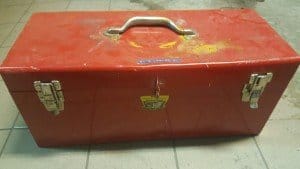This week my Dad would have turned 80, so he is part of the inspiration for this post. He had apprenticed in Austria as a teenager, and when he arrived in Canada he got a job, bought tools, and went to work, all within a few days.
He knew a trade, and then bought the tools he needed to do the job. But it isn’t always that straightforward.
I learned a lot from my Dad, but very little of what he taught me had anything to do with tools.
True, before my first summer working in his steel fabrication plant, we made the obligatory trip to the hardware store (remember Pascal’s?) after which I was “equipped” to work, even though I had barely a clue what I would be doing or what each tool was for.
I still have that red toolbox, with the blue label on it, “91 S. Legler 91.” (My punch card number was 91). Those tools have been doing a lot of dust gathering lately.
The types of tools that I am coming across regularly these days are not the kind you find in any store, hardware or other.
And interestingly enough, I have not been looking for these tools. Instead, the people who are developing these tools have found me. So what kind of tools am I talking about?
It isn’t that easy to even categorize them, but let’s just call them technology platforms for families. Say what?
We all know and understand that the ways that people communicate in 2016 are far different than they were even a decade ago. The ability to connect with people has grown exponentially, which has many positive consequences.
Family communications can be improved in so many ways with these kinds of tools. And the lack of communication within families is one of the biggest contributors to the demise of family wealth.
So naturally, any tool or toolbox that helps families communicate should be a welcome addition, right.
Well, generally, yes, more communication is almost always better than less, so there is that. Where it gets a bit trickier is thinking that the mere existence of the tool will make the family communicate.
Think of the horse you lead to the water, if he isn’t thirsty (and some family horses are more like camels) he may not start drinking for a long time.
The nice thing about creating this type of tool is that you build it once, and then it gets used over and over again. If you build one thing, copy it virtually cost-free for others and sell it to them, well, the profit opportunity can be large.
Now let’s look at the tradesman. This person needs to learn the skills and the tricks of the trade in order to be able to go out and have some valuable help to sell. It isn’t nearly as easy to replicate, as each person is unique and unfortunately not “clonable”.
But that doesn’t mean that the tools are not useful. What it does mean, from my perspective, is that the opportunity to come up with the “killer app” in the family wealth/family harmony space, may not be as profitable as some might expect.
First off, I am getting the feeling that the field is getting crowded.
Secondly, very few families realize that they could benefit from these tools. (Yes, there is a need for them, but that is not the same as saying there is a demand for them).
Maybe I am biased by the fact that I am a tradesman in this space, and I like to think that there is some magic in my words and the way I communicate with people in families, without much in the way of a toolbox.
Ideally, many families will benefit from qualified helpers and some of the great tools that are being developed.
My tendency would be to defer to a skilled person with a mediocre tool over someone with a great tool but without the proper training or skills.
As this field continues to evolve, I will continue to work on my craft, while incorporating the best tools I come across.


